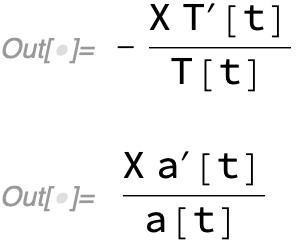I have a simple expression involving a derivative:
x[t_] = Q/T[t];
Simplify[Derivative[1][x][t] /. Q -> x T[t]]
That produces:$$-\frac{x T'[t]}{T[t]}$$I have another relation: $T=a^{-1}$. When I make the substitution, I get this:
Simplify[-((x*Derivative[1][T][t])/T[t]) /. T[t] -> 1/a[t]]
$$-x a[t] T'[t]$$
But what I want is this: $$x \frac{a[t]}{a'[t]}$$I know I can force the issue with an additional substitution of $T'[t]=-a'[t]^{-1}$, but it seems to me that I've already given Mathematica everything it needs to make that substitution on it's own. How do I force MMa to recognize this kind of substitution in the derivative?



Derivativeto take substitutions into consideration, then you probably need to make them before applying that function. Additionally, did you intendxandx[t]to be different? $\endgroup$x, which is treated like a number, instead ofx[t]in your substitution? (= Marco’s question) (2) The syntax ofDerivative[order][func][arg]requires that a functionfbe substituted forfunc, not an expression likef[t]that represents the value of a function. $\endgroup$